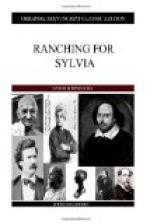“They seem to have had a good harvest from what Edgar wrote; he hinted that he might make a trip across.”
“It’s rather an expensive journey.”
“That wouldn’t trouble Edgar, and there’s a reason for the visit. He has made up his mind to start farming and wants to talk over his plans. In fact, he thinks of getting married.”
Sylvia showed some interest.
“To whom? Why didn’t you tell me earlier?”
“I only arrived this morning, and I wrote some time ago, asking if you could meet Stephen and me. You were with the Graysons then, but you didn’t answer.”
“I forgot; I don’t always answer letters. But who is the girl? Not Miss Grant?”
“Helen Taunton. Do you know her?”
Sylvia laughed.
“The storekeeper’s daughter! She’s passably good-looking and her father’s not badly off, but that’s about all one could say for her.”
“Do you know anything against the girl?”
“Oh, no!” said Sylvia languidly. “She’s quite respectable—in fact, they’re rather a straight-laced people; and she doesn’t talk badly. For all that, I think you’ll get a shock if Edgar brings her home.”
“That is not George’s opinion. We wrote to him.”
Sylvia laughed.
“He would believe in anybody who looked innocent and pretty.”
Ethel’s expression hardened; Sylvia had not been considerate.
“I don’t think that’s true. He’s generous, and though he has made mistakes, it was only because his confidence was misled with a highly finished skill. One wouldn’t look for the same ability in a girl brought up in a primitive western town.”
“After all,” said Sylvia tranquilly, “she is a girl, and no doubt Edgar is worth powder and shot from her point of view.”
“It doesn’t seem to be a commercial one,” Ethel retorted. “Stephen had a very straightforward letter from this storekeeper. But I’m inclined to think I had better go on with my writing.”
Sylvia moved away. She had no reason for being gracious to Ethel, and she took some pleasure in irritating her.
In a few minutes Bland came in. The hall was large, and Ethel was hidden from him in the recess. He strode toward Sylvia eagerly, but she checked him with a gesture.
“You have come back early,” she said. “Wasn’t the sport good? What has become of Kettering and the others?”
The man looked a little surprised. This was hardly the greeting he had expected, after having been promised a quiet half-hour with Sylvia; but, looking round, he saw the skirt of Ethel’s dress and understood. Had it been George she wished to warn, she would have used different means; but Bland, she was thankful, was not hypercritical.
“The sport was poor,” he told her. “The pheasants aren’t very strong yet, and it was hard to drive them out of the covers. As I’d only a light water-proof, I got rather wet outside the last wood and I left the others. Kettering wanted to see the keeper about to-morrow’s beat, but I didn’t wait.”




